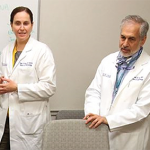
docstockmedia / shutterstock.com
If you had asked Ray Waldrup in 1981 what he would be doing in 2018, serving as the CEO of the largest rheumatology practice in the U.S. would probably not have been his first guess. Back then, as a young college student in Georgia, Mr. Waldrup took a job at a national jewelry retailer and quickly worked his way up to sales, then management. Enjoying his success, he ultimately decided to leave school to pursue a lucrative business career.
“Bill Gates and I dropped out of different schools together,” he jokes. “I started making money, and I never looked back.”
The Business of Medicine
Today, he runs South Carolina-based Articularis Healthcare, which boasts 12 locations in two states. The rheumatology group employs roughly 240 people, including 26 rheumatologists, 12 nurse practitioners and physician assistants, and a pathologist.
“We relieve a lot of the business stress for physicians,” Mr. Waldrup explains. “A lot of them profess to understand it, but if you’re seeing patients all day you don’t have time to keep up with the business side.”
Articularis Healthcare got its start in 2009, when Mr. Waldrup joined a practice with four rheumatologists and 25 employees, Low Country Rheumatology in South Carolina. By then, he had worked with one of the largest anesthesia management companies in the U.S., Medac Inc., and founded Anesthesia Billing Associates Inc. He had developed the expertise, working with multiple specialties, to understand the needs of rheumatologists.
He then sought to expand the practice by merging other providers into it.
“There are 2.4 physicians in the average rheumatology practice,” he says. “I sat down with physicians [in the area] and asked them why they weren’t working with the other group in town.”
He quickly learned that “rheumatologists like to do their own thing,” and growing would take more work, as well as patience. So he let it go for a while, over time continuing to demonstrate what teaming up could help them achieve, like reduced overhead and higher revenues.
“The following year, we had a state rheumatology meeting and asked a couple of attorneys we’d invited to pitch what it would be like to be one group,” Mr. Waldrup says. “We took the three groups that were interested and got started. After a short period of time, we drastically reduced their costs on drugs and their processes in the office.”
‘The whole goal of what we’ve tried to do is keep physicians independent,’ Mr. Waldrup explains.
It’s been nothing but growth since. Low Country Rheumatology, now part of the larger Articularis group, will soon expand beyond South Carolina and Georgia, Mr. Waldrup says.


